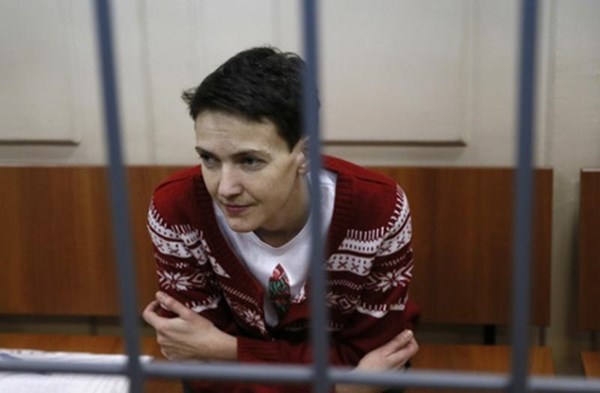Savchenko could be exchanged for Alexandrov and Yerofeyev before the end of May
It became known to RBC that Moscow and Kiev have agreed on a mechanism for the release of pilot Nadiya Savchenko and two Russians that are considered “GRU soldiers” in Ukraine. They will be transferred to Russia to serve their sentence at home in synchronization before the end of May.
According to RBC, and a federal official source close to the leadership of the Federation Council confirmed, Moscow will transfer Nadiya Savchenko to Ukraine to serve her sentence and Kiev will return two convicted soldiers to Russia; Alexander Alexandrov and Eugene Yerofeyev, who are considered "GRU soldiers". These processes are synchronized but the transfer can only happen after the conviction of Alexandrov and Yerofeyev enters into force – which means around the the end of May.
Under Russian law, the verdict comes into force ten days after the announcement or if it hasn't been appealed, according to Ukrainian law, after 30 days. The verdict for Savchenko went into force on April 5 but the conviction of Alexandrov and Yerofeyev will enter into force in the middle of May, if it isn’t appealed before then.
"The time allowed for appeal procedures must pass. That's why it all hangs in the air until May," the source in the Federation Council said. According to the source, the exchange of several more Russians, in addition to Savchenko, will be discussed in the future.
On March 22, the Donetsk City Court (Rostov region) found Savchenko guilty of the death of Russian journalists and was sentenced to 22 years in prison. The Court concluded that, in the summer of 2014, she fought as part of the Ukrainian Battalion Aydar in the Luhansk region and pointed artillery fire at a journalist crew from VGTRK.
After almost a month, on April 18, a court in Kiev found Russians Alexander Alexandrov and Evgeny Yerofeyev guilty of terrorism and participation in hostilities in the Donbas. They were sentenced to 14 years in prison.
Savchenko's lawyer Nikolai Polozov told RBC that countries cannot use a direct exchange procedure for Savchenko and Yerofeyev and Alexandrov. "A direct exchange could only be applied to prisoners of war, and no one recognizes them as such," Polozov explained. But one of two legal procedures could be used: a pardon or extradition.
"This week, the Ministry of Justice of Ukraine sent a request to Moscow for the transfer of Savchenko so that she could serve her sentence at home. The request of the Russian Ministry of Justice is likely to be filed when the verdict for Yerofeyev and Alexandrov comes into force," the lawyer said.
Yerofeyev's lawyer, Oksana Sokolovskaya, also confirmed to RBC that the agreement on the exchange was actually achieved but she believes that the pardon procedure will be used. In this case, the parties also have to wait for the entry of sentence but all will depend on the decisions of the presidents.
According to Sokolovskaya, the lawyers have not filed an appeal against the verdict for the Russians. "If the negotiations will go in the same vein, no one will appeal the verdict as it will prevent the exchange," she said
The extradition of convicts is governed by the Convention on the Transfer of Sentenced Persons 1983 and the Criminal Procedure Code of Russia and Ukraine. According to the Russian Ministry of Justice, the parties should exchange document packages which, in particular, should include the recognition of court decisions by both countries and the sentences should be executed. If Moscow or Kiev announces their intention to release the convicts then, in accordance with the Criminal Procedure Code, it will be a basis for refusal. However, under the Convention, each party may declare pardon, amnesty or reduce punishment in accordance with the Constitution or other legislation. Extradition can also be prevented if the convicted person will be persecuted in their homeland with additional charges not specified in the request.
The Ministry of Justice of both countries, having received such requests for extradition under the current legislation, asks the State Penitentiary Service to prepare documents, reviews the request and then sends the documents to the court. The final decision on extradition is made by the court. The case is examined by the court, which is located at the place of residence of the convicted person.
In a conversation with RBC, Savchenko's lawyer Nikolai Polozov said that the Russian authorities have to consider the request for the transfer during the next month but could request additional time. Terms for the consideration of the request are not specified in the Convention.
Before sending a request for the transfer of Savchenko, the Ukrainian Justice Ministry sent a request for the transfer of four previously convicted Ukrainians in Russia whose sentences have already entered into force. On April 8, it became known that the Russian Ministry of Justice instructed the Federal Penitentiary Service to prepare the documents for resolving the issue of transfer of the four convicts to Ukraine and, on April 12, the Russian Ministry of Justice reported that the agency sent a request for the transfer of six convicted Russians to the Ukrainian side.
Ukraine had asked for the transfer of Oleg Sentsov, Alexander Kolchenko, Gennady Afanasyev and Yuri Soloshenko. Three of the defendants were convicted as a part of the so-called case of the Crimean terrorists: director Oleg Sentsov was sentenced to 20 years in a maximum security prison and was transported to Yakutia while activists Alexander Kol'chenko and Gennady Afanasiev received ten and seven years imprisonment respectively. Soloshenko – the former director of the Ukrainian defense plant Znamya - was convicted last year for spying for Ukraine. The Moscow City Court sentenced him to six years in a penal colony.
